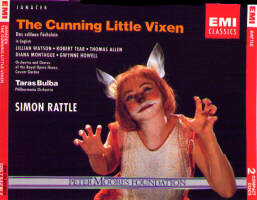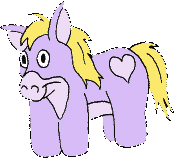
 |
Leos Janacek based his 1924 opera on Rudolph Tesnohlidek´s newspaper serial and novel of the same title. The first two acts closely followed Tesnohlidek´s story, beginning with the vixen´s capture, adventures in the forester’s house, escape, and courtship. (Some parts such as the battle in the kitchen proved too impractical to perform on stage and had to be omitted.) Janacek dramatically departs from the original narrative in Act Three with Sharp-Ears being shot and killed by Harasta the poacher. After learning of the event, the aging forester walks through the woods reflecting on all the changes that have occurred in his life. In a dream sequence he sees the forest just as it was the day he captured the vixen. Surrounded by the animals from the first act, including a baby Vixen Sharp-Ears, he realizes that death is not a finite end in nature, but merely part of a self-renewing cycle.
The opera takes many of it´s light hearted scenes from the book. To highlight some of the sillier moments, Janacek uses excessively grand and sweeping music, exaggerating the situation. My favourite examples are the overwrought, melodramatic ´Look what we’ve got down ´ere,´ in which Sharp-Ears bites the forester´s grandson in an escape attempt, and the martial themes from ´Sharp-Ears as politician.´ In the opera´s more serious moments, Janacek´s music is more subtle. The interlude following Sharp-Ear´s death is a good example, but I´m particularly fond of the instrumental piece in Act One in which Sharp-Ears appears as a young girl.
The EMI Records version of the opera is sung in English. It also includes a booklet with background on Janacek, a synopsis of the plot, photos, and the lyrics. This is quite helpful in understanding the story not only because it is easier to understand the words, but also because the opera frequently uses pantomime and dance as plot elements, which can not be seen in an audio recording.
I had been wanting to hear this opera ever since I read it´s translation in 1986. Ten years later, I finally managed to track down a copy on the Internet. The music was a bit darker in tone than I expected and I had too listen to it several times to really understand what was going on, but it´s quite enjoyable. I´m afraid I´m not much of an authority on opera, so if you´d like to read a more accurate description of the work, you can find one at Robert T. Jones´ web page. Mr. Jones worked on the translations for both the Peter Moores Foundation´s production and the translation of the original novel. When I corresponded with him, he was kind enough to recommend the EMI version to me. For those of you who may wish to hear the piece sung in it´s original Czech, Mr. Jones expressed a preference for the recording by Supraphon Records, conducted by Vaclav Neumann.
You can purchase the EMI recording at the CD Banzai web site. Music Boulevard also offers several versions and has audio samples in MPEG format.
 | Return to the Foxy Treasures Page! | Return to the Skippy & Liska Home Page! |  |